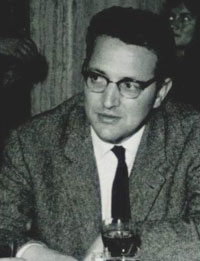Martin CAMAJ

Camaj (1925-1992) was born in Temali in the Dukagjin region of the northern Albanian alps. He is an émigré writer of significance both for Albanian literature and for Albanian scholarship. He received a classical education at the Jesuit Saverian college in Shkodër and studied at the University of Belgrade. From there he went on to do postgraduate research in Italy, where he taught Albanian and finished his studies in linguistics at the University of Rome in 1960. From 1970 to 1990 he served as professor of Albanian studies at the University of Munich and lived in the mountain village of Lenggries in Upper Bavaria until his death on 12 March 1992.
Camaj's academic research has concentrated on the Albanian language and its dialects, in particular those of southern Italy. His literary activities over a period of forty-five years cover several phases of development. He began with poetry, a genre to which he remained faithful throughout his life, but in later years also devoted himself increasingly to prose. His first volumes of classical verse Nji fyell ndër male, Prishtina 1953 (A flute in the mountains), and Kânga e vërrinit, Prishtina 1954 (Song of the lowland pastures), were inspired by his native northern Albanian mountains for which he never lost his attachment, despite long years of exile and the impossibility of return. These were followed by Djella, Rome 1958 (Djella), a novel interspersed with verse about the love of a teacher for a young girl of the lowlands. His verse collections Legjenda, Rome 1964 (Legends) and Lirika mes dy moteve, Munich 1967 (Lyrics between two ages), which contained revised versions of a number of poems from Kânga e vërrinit, were reprinted in Poezi 1953-1967, Munich 1981 (Poetry 1953-1967). Camaj's mature verse reflects the influence of the hermetic movement of Italian poet Giuseppe Ungaretti (1888-1970). The metaphoric and symbolic character of his language increases with time as does the range of his poetic themes. A selection of his poetry has been translated into English by Leonard Fox in the volumes Selected Poetry, New York 1990, and Palimpsest, Munich & New York 1991.
|
![]()
BACK

